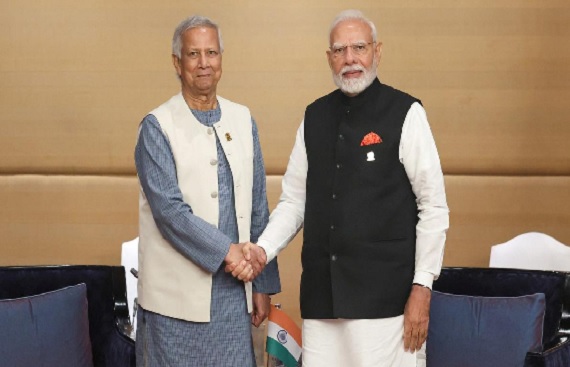India Cancels Bangladesh's Cargo Transit to Third Countries

India has officially revoked the transshipment facility that previously allowed Bangladesh to export goods to third countries via Indian land borders. However, the Indian government has assured that exports to Nepal and Bhutan, which transit through Indian territory, will remain unaffected.
Economists and business leaders in Bangladesh have downplayed the potential impact of this decision, suggesting it could have economic repercussions for both nations, particularly as India may lose revenue from the service. On April 8, India's Central Board of Indirect Taxes and Customs issued a circular rescinding its earlier directive that permitted Bangladeshi export cargo to pass through Indian Land Customs Stations en route to Indian ports and airports. The new circular states, "It has been decided to rescind…the circular…dated June 29, 2020, as amended, with immediate effect." It also clarifies that cargo already in India will be allowed to exit according to the previous regulations.
According to the Indian Express, this decision followed Bangladesh's push to extend Chinese economic influence into the strategically significant Northeast India region. During a recent visit to China, Chief Adviser Muhammad Yunus advocated for establishing a Chinese economic base in Bangladesh, emphasizing that Bangladesh serves as the "only guardian of the ocean" in the region. Reports suggest that Bangladesh's plans to create a strategic base near the Chicken's Neck area with Chinese assistance may have influenced India's action.
The Indian Ministry of External Affairs reiterated on April 9 that the decision would not impact Bangladesh's exports to Nepal or Bhutan transiting through Indian territory. Official spokesperson Randhir Jaiswal explained that the transshipment facility had led to significant congestion at Indian airports and ports, causing logistical delays and increased costs for Indian exports, prompting the withdrawal of the facility.
Industry insiders in Bangladesh noted that during crises or surges at Hazrat Shahjalal International Airport, some goods are shifted to airfreight to meet deadlines, and certain fashion brands occasionally request shipments via Indian airports. Abdullah Hil Rakib, former senior vice president of the BGMEA, stated that while the change may not significantly affect Bangladeshi businesses, India could lose considerable revenue from the surplus cargo space previously allocated for Bangladeshi goods.
Kabir Ahmed, president of the Bangladesh Freight Forwarders Association, acknowledged that while the shift may create initial challenges, it can be managed through coordination among the Civil Aviation Authority, Biman Bangladesh Airlines, and freight forwarders. He suggested utilizing airports in the UAE, Sri Lanka, and the Maldives for additional cargo at comparable costs, which could help Bangladesh maintain its revenue.
The anticipated opening of Dhaka airport's third terminal by the end of this year is expected to enhance its cargo handling capacity, with a Japanese company set to manage ground and cargo operations, thereby improving efficiency. Professor Mustafizur Rahman from the Centre for Policy Dialogue remarked that transshipment facilities are rarely used, and if pressure arises at Dhaka airport, alternative expedited cargo services can be implemented.
M. Humayun Kabir, a former ambassador, expressed concern that India's abrupt decision sends a negative signal, emphasizing the importance of dialogue in addressing bilateral matters. He noted that the benefits of Bangladesh's transit and transshipment to India should not be viewed solely in terms of reciprocity. BKMEA President Mohammad Hatem stated that while the change is unlikely to impact exports, it raises concerns about higher airfreight costs in Bangladesh compared to India, urging the interim government to investigate and address these costs.
